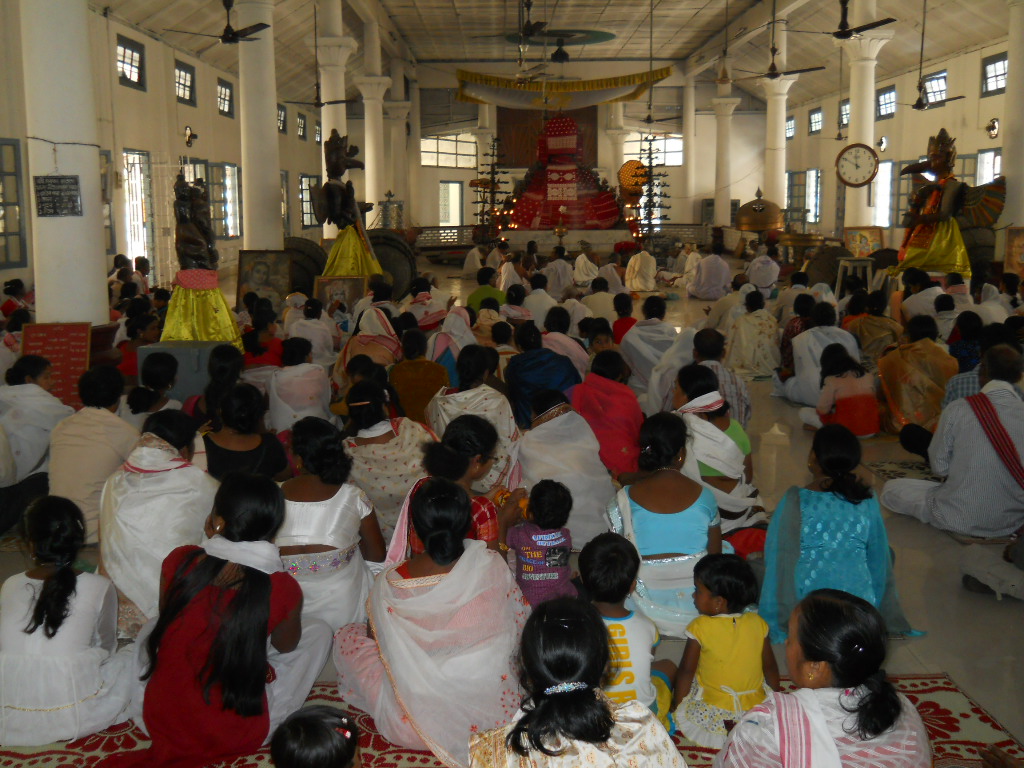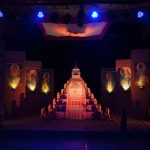It is generally assumed that the English philosopher, John Locke (1632-1704) introduced the concept of feminism in 1689 AD. Locke opposed patriarchal rule and the God-given right of kings. But his theories did not extend to the sphere of home. He believed that women were naturally and voluntarily subservient to their respective fathers and husbands. In later period, different authors like Mary Wollstonecraft, John Stuart Mill, Kodse, Simone-De-Beauvoir, John Survey etc took up this subject in their writings. ‘Le deuxième sexe’ (1949) by Simone-De-Beauvoir gave a definite shape to the modern feminist theory. Betty Friedan’s book ‘The feminine mystique’ (1963) was another milestone. It challenged the prevalent notion that women could find fulfilment of their lives only as wives and mothers. The Indians also applied the concept of feminism in the political arena by raising the issue of women’s rights.
But many people do not know that Srimanta Sankaradeva had introduced the concept of feminism way back in the fifteenth century itself, before the advent of all the above-mentioned proponents of feminism. Srimanta Sankaradeva was not merely a religious preacher. Unlike other religious preachers of the world, Srimanta Sankaradeva was a full-scale litterateur as well as a social reformer. Some people seek to compare his primary feminism with the developed concept of feminism of today. As a result, they get confused and they surmise that Srimanta Sankaradeva was not a feminist at all.1 Moreover those people, who equate feminism with sexual liberation, cannot grasp the subtle feminist concept of Srimanta Sankaradeva.
The time of Srimanta Sankaradeva’s advent was a horrible time. Women had no honour in those days. They were taken by the Bhogî (a man selected to be sacrificed before the deity) at any time. That situation arose from the lewd behaviours of the Tântriks. “Making the women object of enjoyment as well as worship in the name of Sahajîyâ path of the Tântrik cult gave rise to adultery.”2 Srimanta Sankaradeva redeemed women from that degraded state of being object of enjoyment, and elevated her to the equal status of men in the performance of religion of devotion. Women had the right to arrange offerings in the Kirtan-ghar, perform Nâma-kirtana etc in the Eka Sharana Nâma Dharma preached by him, which was not possible in other branches of Sanâtana religion. Srimanta Sankaradeva initiated many women in his Eka Sharana Nâma Dharma. He advised the married couples to offer Bhakti to God together. So women played a crucial role in the propagation of the Eka Sharana Nâma Dharma.3 Kalindi, the second wife of Srimanta Sankaradeva initiated devotees after the passing away of the saint. Such a thing was not possible in any other religious order in those days.
There are many evidences that Srimanta Sankaradeva gave high honour to women. The instance of making a woman named Radhika alias Yogamaya the leader of the volunteer force at Tembuwani for construction of dam was an important example of that. It was because of that tradition of giving high status and importance to women, initiated by Srimanta Sankaradeva that emergence of women organizers like Kanaklata or litterateur like Padmapriya became possible in the history of Eka Sharana Nâma Dharma.4 Kanaklata was wife of Srimanta Sankaradeva’s grandson Chaturbhuj. She took forward the religious movement of Srimanta Sankaradeva after the demise of her husband. On the other hand, Padmapriya was daughter of Gopaladeva, a disciple of Madhavadeva and a great leader of Eka Sharana Nâma Dharma. She took active part in religious activities along with her father. She also composed devotional hymns. She even trained the devotees. Contrary to such a heritage of respectability and active participatory role for women in Eka Sharana Nâma Dharma, even the so-called communists of India did not include a single woman in their politburo till the twenty first century.5 So Srimanta Sankaradeva was more progressive than the so-called progressive intellectuals of the modern era.
That Srimanta Sankaradeva was progressive in his thought is amply proved by his writings. A revolt against the traditionalists was brewing in his maiden book ‘Harishchandra Upâkhyâna’ itself. The people who torture women are strongly condemned here.
Streeka durbala kare konano niskhale
Jvalanta bahnika bândhe bastrara ânchale
(Harishchandra Upâkhyâna / 75)
[Meaning : Which demeritoreous person would try to demean woman ? He would be tying burning fire in cloth end.]
Srimanta Sankaradeva clearly recognized the immense strength of women by comparing her with burning fire in this verse. Even more important than that is the offering of apology by men to women in his writings.
Keli koutuhale âsilihi mora pâsha
Krirâta karilo toka jibâ parihâsa
Yena bhaila rangara samaya mana rosha
Ehi tota sâdho tâta nadharibi dosha
(Harishchandra Upâkhyâna / 438)
[Meaning : You were beside me at the time of frolick. I might have joked with you in fun. I might have been angry at the time of play. I beseech you not to take offense at those.]
This description by Srimanta Sankaradeva of king Harishchandra offering apology to his wife Shaibya is a recognition of the rights of women as well as of the self respect of women. These are the harbingers of feminist thoughts. There is also proof in this book that Srimanta Sankaradeva considered women as partners of men in intellectual pursuits.
Karmara samayata toka mantri buli lekhi
Rangara belâta yena toi prânasakhi
(Harishchandra Upâkhyâna / 436)
[Meaning : I consider you as an advisor at the time of work. You are beloved friend at the time of play.]
This bestowal of the status of advisorship upon Shaibya by king Harishchandra implies equal rights for women as men. Srimanta Sankaradeva would not have incorporated such comments or descriptions in ‘Harishchandra Upâkhyâna’, had he not subscribed to that concept himself.
Women are traditionally considered to be subservient to men in the Indian society. The traditional thinking is such that the wife must do what her husband does; she has no right to behave otherwise. But Srimanta Sankaradeva showed in his personal life that he recognized the independent thoughts of women. Though he preached a religion named Eka Sharana Nâma Dharma, he never forced his wife Kalindi to accept that religion. He initiated her in the Eka Sharana Nâma Dharma only when she wanted to get initiated in it of her own accord. Till then, she had been worshipping a lesser deity Ghar-deuti, not worshipped the supreme God, lord Hari as preached by her husband Srimanta Sankaradeva.6 It is of great significance that Srimanta Sankaradeva did not initiate his own wife in the Eka Sharana Nâma Dharma till the time she wanted to accept it herself.7
The way Srimanta Sankaradeva depicted the character of Sita in his Assamese rendering of Uttarâkanda Râmâyana is also a proof of his support to the concept of women’s rights. The reaction of Sita in the description of Rama banishing her is different from the depiction of meekness in the original Râmâyana. Sita accepts the order of banishment humbly in the the original Râmâyana. But Sita of Srimanta Sankaradeva’s Uttarâkânda Râmâyana makes derisive comments to Rama.8
Âwe Râma swâmi sukhe bhunjantoka râja
Mari jâo moi nimâkhiti banamâja
(Uttarâkânda Râmâyana / 23)
[Meaning : Let husband Rama now enjoy the kingdom happily. I, helpless one will die in the midst of forest.]
This derisive comment by Sita means that she did not accept her banishment and she derided the capacity of Rama to banish her. This expression is an original creation of Srimanta Sankaradeva. Even when Rama sent Hanumana, Bibhishana etc to the Âshrama of Valmiki for bringing Sita back, Sita spoke with vengeance. She said that there would not be a greater unashamed woman on the earth than her if she again spoke herself as Rama’s wife.
Bolâibo gharani âro Râghavara ghare
Nâi teve nâri nilâjini mota pare
(Uttarâkânda Râmâyana / 299)
[Meaning : There would not be a greater unashamed woman on the earth than me if I again speak myself as Rama’s wife.]
Sita also said that she would have given up her life in Lanka itself had she known Rama to be so cruel.
Moi jeve jâno Râma enuwâ nirdaya
Lankâte tejilo hante prânaka nischaya
(Uttarâkânda Râmâyana / 303)
[Meaning : I would have given up my life in Lanka itself had I known Rama to be so cruel.]
The incident of Sita entering earth after again facing trial in the court of Rama on her return to Ayodhya is there both in the original Râmâyana as well as Srimanta Sankaradeva’s rendering of Râmâyana. But whereas Sita takes leave of Rama after expressing her love for him in the original Râmâyana, she takes leave of Rama after expressing disenchantment with him in Srimanta Sankaradeva’s rendering.
Duste dila apajasha tâte âna trâsa
Sale niyâ diyâilanta âmâka nirbâsa
Dekhâ dekhâ ito kene swâmira maryâdâ
Kisaka karile etamâna salabâda
(Uttarâkânda Râmâyana / 365)
[Meaning : He got so panicky over loose talk by evil person that he banished me in forest by trick. See, see, how cruel is this husband. Why did he resort to so much tricks ?]
Râghavaka sâi kope katâkshe nirikhi
Bolanta erilâ moka tumi kibâ dekhi
(Uttarâkânda Râmâyana / 371)
[Meaning : Sita asked looking angrily at Rama on what ground he left her.]
Sita even declared that she did not wish to hear the name of Rama again.
Âura jena nushuno Râmara ito nâu
Phât diyâ Basumati pâtâle lukâu
(Uttarâkânda Râmâyana / 381)
[Meaning : Let me not hear this name of Rama again. O earth, open up, I want to hide in underworld.]
Srimanta Sankaradeva departed from the scriptures of Sanâtana religion by depicting the character of Sita in a protesting style. Thus he created a progressive trend of his own. We can say that the concept of feminism was embedded in this trend initiated by Srimanta Sankaradeva. Certainly he was a pioneer of feminism.
The time when Srimanta Sankaradeva started his reform activities, was a very adverse period in the history of Assam. He was faced with opposition at every step. The feminists of today do not have to face such inconveniences. So even the utterance of a single sentence in support of women’s honour in those times can be considered to be equivalent to writing a serious research book as of today. We can judge the contribution of Srimanta Sankaradeva to the feminist movement only if we proceed in such a comparative assessment. Srimanta Sankaradeva certainly deserves the status of a pioneer in the movement of feminism on that criterion.
References and notes
1. Adhunik nârîbâdî dhâranâ âru Sankari nâtar nârî bhâvanâ, Dr Lopa Barua, in Nâmdharma, edited by Prasanna Saharia, Fifty fifth volume, Issue one, Nagaon, October 2005 AD, p. 65.
2. Asomor sânskritik itihâs, Jatindra Kumar Borgohain, First edition, Jorhat, 1989 AD, p. 181. However according to Borgohain, even though women acquired high status in Srimanta Sankaradeva’s scheme of things, the equality of men and women was not established on a firm footing in the Eka Sharana Nâma Dharma. But that was quite natural. One cannot attain full equality from a position of gross inequality in one go.
3. Eka Sharana Nâma Dharmat nârîr sthân, Dr Sanjib Kumar Borkakoti, in Âmar Asom, edited by Dr. Nagen Saikia, Guwahati, January 18, 2005 AD. This article is compiled in the author’s book Sankari sâhitya âru sanskritir baishishtya, First edition, Guwahati, 2006 AD.
4. Samâj sanskârak Srimanta Sankaradeva, Dr Sanjib Kumar Borkakoti, in Âkâshi Gangâ, Souvenir of Platinum Jubilee of Srimanta Sankaradeva Sangha, edited by Kailas Das, Nagaon, February 9, 2006 AD.
5. The Communist Party of India elected a woman, Brinda Karat as member of their politburo for the first time in 2005 AD. Other communist parties have not yet done that. So the communists, who criticise Srimanta Sankaradeva, themselves continue to carry medieval mindsets. [See Sankaradeva adhyayanat bishangati, Dr Sanjib Kumar Borkakoti, First edition, Guwahati, 2005 AD.]
6. Mahapurusha Srimanta Sankaradeva, Dr Sanjib Kumar Borkakoti, First edition, Guwahati, 2005 AD, pp. 52-53. According to hagiographer Puwaram Mahanta, Kalindi worshipped the deity Ganesha. But in our view, the description of hagiographer Chakrapani Vairagi is correct. According to Chakrapani Vairagi, Kalindi worshipped the deity Ghar-deuti.
7. Many writers write wrongly that Kalindi was initiated by Madhavadeva. Actually Madhavadeva only gave advices to her. The actual act of initiation was performed by Srimanta Sankaradeva. Later on Madhavadeva gave the necessary guidances to Kalindi.
8. Sankaradevar Sitâ : pratibâdar pratîk, Gitanjali Hajarika, in Purbânchal Abhimat, edited by Dr Lakshminandan Bora, Guwahati, November 19, 2005 AD.




